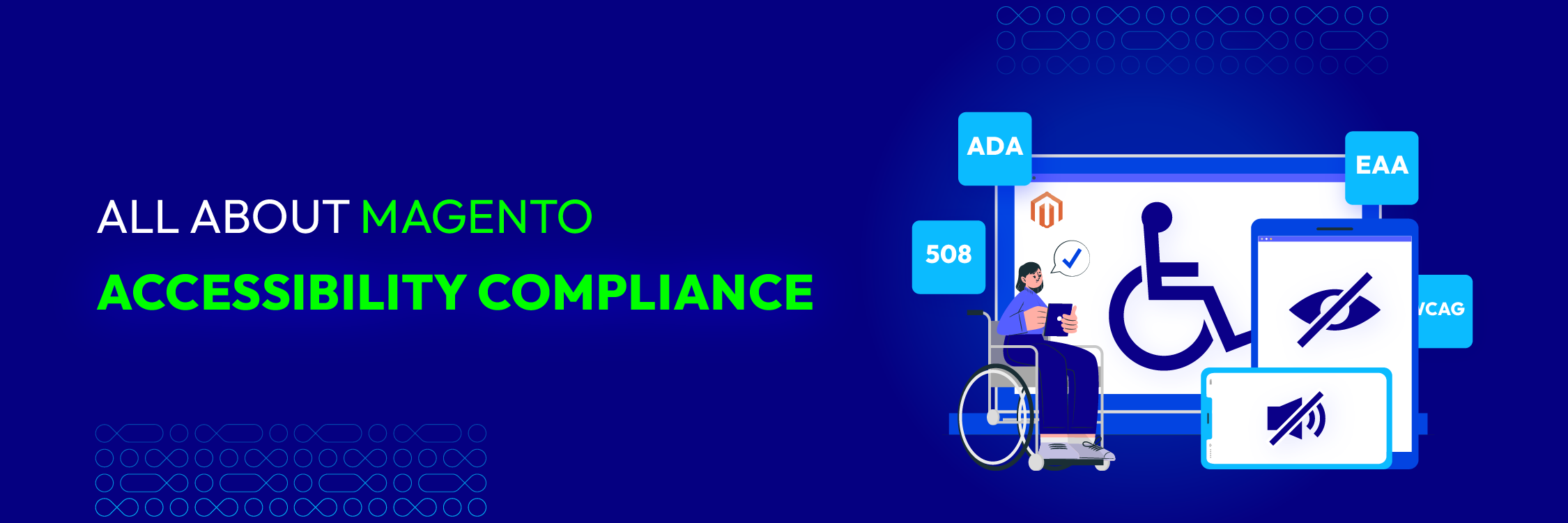Hyvä Theme is Now Open Source: What This Means for Magento Community - Mageplaza
Hyvä is now Open Source and free. Discover what changed, what remains commercial, how it impacts the Magento ecosystem, and how to maximize its full potential.

Since more than 43.2% of online shopping stores are less accessible than other websites, it’s not surprising that eCommerce sites are involved in 82% of expensive accessibility lawsuits. So, if your store uses Magento, making sure it follows accessibility rules is important.
To help you understand Magento accessibility, let’s look at some key regulations your store needs to follow. We’ll also talk about how to meet common standards and share best practices for Magento accessibility.
Accessibility compliance means making sure your website follows certain rules and standards set by laws and guidelines in the countries where you operate. Important regulations and requirements for web stores, including those using Magento, are:
The Americans with Disabilities Act (ADA), which sets accessibility rules for public businesses.
Section 508, part of the 1972 Rehabilitation Act, which sets accessibility rules for government technology.
The European Accessibility Act, which builds on the Web Accessibility Directive.
Web Content Accessibility Guidelines (WCAG) provide web standards for digital content.
The Americans with Disabilities Act (ADA) is a 1990 U.S. law that prevents discrimination based on disability. When it was passed, the internet was just starting, but now people use it daily for information, services, and shopping. Because of this, it’s important for any business or government website to follow ADA rules to be accessible.
Website owners and developers are responsible for making their sites ADA compliant. Here are some key requirements for Magento websites:
Accessible Website Structure: Use semantic HTML for a clear and meaningful website structure and proper headings for screen readers.
Focus and Navigation: Ensure a logical and consistent navigation flow so users can easily navigate the site.
Accessible Rich Internet Applications (ARIA): Use ARIA attributes to make dynamic content and interactive elements easier for everyone to use.
Keyboard Accessibility: Make sure all website functions can be used with a keyboard.
Text Alternatives: Add alt text to images and provide text descriptions for media content.
Form Accessibility: Use clear labels for form fields and ensure error messages are linked to the relevant fields.
Contrast and Color: Maintain good color contrast for text and background elements.
Responsive Design: Make sure your website is designed to adapt to different devices and screen sizes.

Additionally, Magento store owners can use extensions designed to help with ADA compliance. While these won’t make the entire website compliant, they help ensure certain parts meet ADA standards.
Section 508 is an amendment to the Rehabilitation Act that sets rules for federal agencies to make their electronic information technology accessible. It covers similar areas as the ADA and provides a strong framework to make your Magento website inclusive.
If your Magento website is meant for or used by federal agencies, it must follow Section 508’s accessibility standards. These standards are similar to those of the ADA and ensure that everyone, with or without disabilities, has equal access to information.
WCAG (Web Content Accessibility Guidelines) are the global standard for web accessibility, created by the World Wide Web Consortium. ADA compliance often begins with following WCAG guidelines because they cover many of the same aspects.
Magento WCAG Principles (POUR):
Making Magento Content Perceivable:
Ensuring Magento Operability:
Making Magento Understandable:
Supporting Robust Assistive Technologies:
WCAG has 3 levels of conformance: A, AA, and AAA. These levels represent different degrees of accessibility compliance to help organizations meet specific needs and goals. The levels are:
Level A (Basic Accessibility): Ensures web content is accessible to some users with disabilities. Organizations often start here to establish a basic level of accessibility.
Level AA (Standard Accessibility): Makes content usable by a wider audience, including people with various disabilities. This level is considered the standard and is recommended for providing a reasonably accessible experience for a diverse user base.
Level AAA (Enhanced Accessibility): Covers a broad set of requirements for an enhanced user experience. Achieving Level AAA is admirable but may not be practical or necessary for all websites due to its comprehensive nature.
Magento businesses can choose the WCAG level that matches their goals, resources, and desired inclusivity. Achieving Level AA compliance typically ensures meeting other regulations, like ADA or EAA.
The European Accessibility Act (EAA) supports the Web Accessibility Directive (WAD) to enforce accessibility in the EU. Unlike WAD, which only applied to the public sector, the EAA targets both public and private sectors, covering industries like telecommunications, banking, and public transport, similar to the ADA.
EU member states have adopted the EAA into their laws, making it enforceable by June 28, 2025, for companies with more than 10 employees or an annual turnover above €2 million. The EAA does not specify guidelines for improving accessibility, but achieving WCAG AA compliance is a recommended approach. This widely accepted framework ensures digital accessibility and helps Magento platforms meet EAA requirements.
Accessibility is more than just following legal rules. It’s also a smart business move, a way to provide better services and products, and a strategy to improve your brand’s image. Here are some benefits of making your Magento site accessible beyond avoiding legal issues:
An accessible website shows that your brand values inclusivity. This can enhance your brand’s reputation as one that cares about creating an inclusive world.
Accessibility features benefit everyone, not just those with disabilities. For instance, alt text for images helps users with slow internet connections, and closed captions are useful for people who can’t use sound, whether due to hearing impairment or technical issues.
Making your website accessible opens it up to a larger audience. With 1.3 million people living with disabilities, accessibility can significantly expand your customer base.
Following accessibility guidelines can boost your search engine optimization (SEO). Google prioritizes accessible websites, so meeting these standards can help your site rank better in search results, making it easier for people to find you.
Ensuring your Magento site is accessible is an ongoing process. Here are some best practices to help maintain accessibility compliance:
Accessibility compliance can be complex and requires thorough testing. Regularly consult with compliance experts and request detailed accessibility reports to ensure your site meets all standards.
Implement a custom form on your Magento store for users to report accessibility issues. This feedback can be extremely helpful for finding and fixing problems. If budget or time constraints limit your QA resources, consider a bug bounty program to encourage user feedback.

Accessibility standards and laws evolve. Keep up-to-date with the latest guidelines, like WCAG 2.2, and legal updates from sources like ADA.gov. Regular monitoring ensures ongoing compliance and minimizes the risk of legal issues.
Ensuring accessibility compliance for your Magento website is essential for legal adherence, business growth, and positive brand perception. By understanding and implementing key standards such as ADA, Section 508, WCAG, and the European Accessibility Act, you can make your site more inclusive and user-friendly.
Regular audits, staying updated on evolving guidelines, and encouraging user feedback are critical steps in maintaining accessibility. These efforts not only help you avoid legal issues but also enhance user experience, expand your customer base, and improve SEO. Ultimately, committing to accessibility is a valuable investment in the inclusivity and success of your online presence.